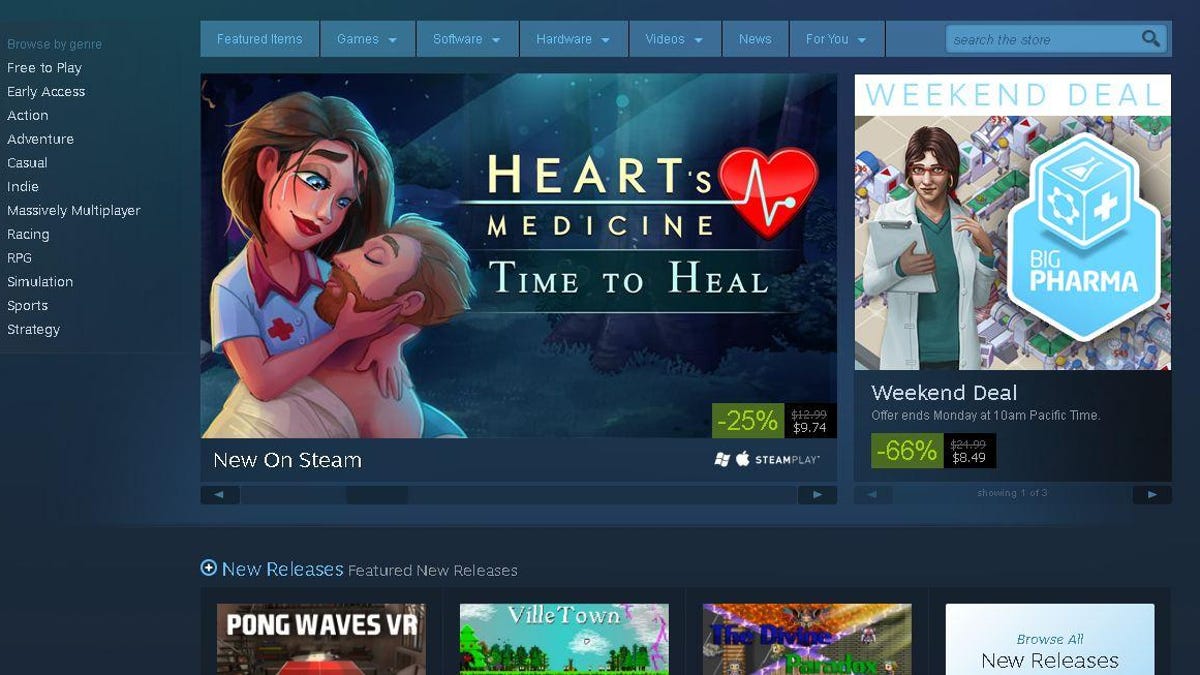Steam Direct will let any developer sell any PC game
Expect more wacky, wild games to choose from in the world's biggest PC game store.
Steam, the world's biggest PC game store, is about to get a lot bigger.
That's because its owner, game developer Valve, is done picking and choosing which games will appear there. (Yes, the same Valve behind Half-Life, Portal and DOTA 2, among other popular games.)
Valve has been experimenting for the past five years with a feature called Steam Greenlight, which lets users vote for games they think are worthy of making the Steam store. But even after the voting, Valve still had to step in. So the company has just announced it's getting rid of Greenlight.
Instead, Valve will soon let any developer publish any of their own games to the Steam platform.
The new system is called Steam Direct and is coming this spring. There are a few caveats to keep the quality of games at a bare minimum. To start with, there's going to be a set but "recoupable" fee. This is from a blog post by Valve UI designer Alden Kroll:
"We will ask new developers to complete a set of digital paperwork, personal or company verification, and tax documents similar to the process of applying for a bank account. Once set up, developers will pay a recoupable application fee for each new title they wish to distribute, which is intended to decrease the noise in the submission pipeline."
According to the Seattle Times, Valve will still check to see whether the games actually work and make sure they don't break local laws on pornography or other forms of restricted content.
While it's not explicit in his blog post, we confirmed with Kroll that the new system will have no more user voting. Register with Valve, pay a fee, and your legal, working game will get published on Steam.
In other words, Valve is moving away even further away from the kind of "walled garden" curation approach Apple takes with the iTunes App Store. It'll be much more like the Google Play store on Android.
One major difference may be how much developers have to pay to get their games on the store: While Google charges a registration fee of just $25, it sounds like Valve's fee could be a bit higher:
"We talked to several developers and studios about an appropriate fee, and they gave us a range of responses from as low as $100 to as high as $5,000. There are pros and cons at either end of the spectrum, so we'd like to gather more feedback before settling on a number."
Valve also has some recently-added discovery tools that could help people find what they want to play, even if there's a huge influx of new game titles.
For instance, according to SteamSpy, a third-party that tracks Steam data, over one-third of all Steam games ever released were published in 2016.
And yet that huge wave of additions doesn't seem to be pushing buyers away. In a data-heavy explanation published at Gamasutra, Valve says that per-player purchases have actually doubled since Valve introduced its recent Discovery Update.
Mostly unrelated but worth noting: Valve revealed Thursday that it's building three brand new games specifically for virtual reality.
Does the Mac still matter?Apple execs tell why the MacBook Pro was over four years in the making, and why we should care.
Tech Enabled: CNET chronicles tech's role in providing new kinds of accessibility.


